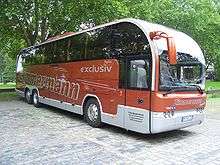Automotive industry in Turkey
The automotive industry in Turkey plays an important role in the manufacturing sector of the Turkish economy. The companies operating in the Turkish automotive sector are mainly located in the Marmara Region.
In 2015 Turkey produced over 1.3 million motor vehicles, ranking as the 14th largest producer in the world.[1] With a cluster of car-makers and parts suppliers, the Turkish automotive sector has become an integral part of the global network of production bases, exporting nearly $20 billion worth of motor vehicles and components.[2] In 2017 nearly 85% of exports went to Europe.[3] Global car manufacturers with production plants include Fiat/Tofaş, Oyak-Renault, Hyundai, Toyota, Honda and Ford/Otosan.
The foundations of the industry were laid in the 1950s when TOE (Türk Otomotiv Endüstrileri A.ş.) started producing REO military truck and later trucks by International Harvester. A brief foray in car production was stopped short. In 1961 the first domestic car Devrim was made by a train manufacturer TÜLOMSAŞ. With the establishment of the Otosan assembly factory in 1959, mass production of the domestic car Anadol started in 1966.
History
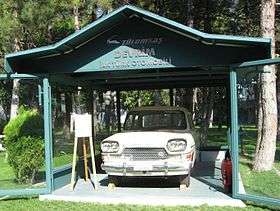
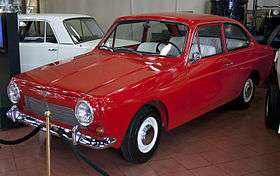
.jpg)
.jpg)
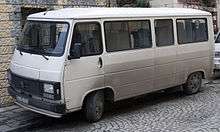
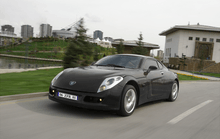
In 1929 the first car was assembled in Istanbul by Ford Motor Company. 48 cars were produced daily. However, production ended due to the Great Depression of the 1930s.
In 1954 the Jeep factory was established for the production of Turkey's Willys-Overland vehicles in Tuzla, Turkey.
In 1959 the Otosan factory was established in Istanbul to produce the models of the Ford Motor Company under licence in Turkey. Production of the Ford Consul at the Otosan factory began in 1960.
In 1961 the Devrim sedan was manufactured at the Tülomsaş factory in Eskişehir. It was the first indigenously designed and produced Turkish automobile.
In 1964 the production of the Austin and Morris vehicles of the British Motor Corporation began at the BMC factory in İzmir. The BMC brand was later fully acquired by Turkey's Çukurova Group in 1989, which currently produces all BMC models in the world.
In 1966 Anadol became the first mass-produced Turkish automobile brand. All Anadol models were produced by the Otosan factory in Istanbul.
In 1968 the Tofaş factory was opened in Bursa for producing Fiat models under licence.
In 1969 the Oyak-Renault factory was established in Bursa for producing Renault models.
Other global automotive manufacturers such as Toyota, Honda, Opel, Hyundai, Mercedes-Benz and MAN Truck & Bus produce automobiles, vans, buses and trucks in their Turkish factories. There are also a number of Turkish bus and truck brands, such as BMC, Otokar and TEMSA.
By 2004, Turkey was exporting 518,000 vehicles a year, mostly to the European Union member states.[4]
In 2006, the European Investment Bank loaned Tofaş €175 million to jointly develop and produce with PSA Peugeot Citroën and Fiat Auto small commercial vehicles for the European market. The loan, part-financing for total investments estimated at €400 million, was intended to result in an important expansion of the company's production capabilities and create around 5,000 new jobs. The vehicles will be produced at the manufacturing plant of Tofaş in Bursa with an additional, initial, annual capacity of 135.000 cars, due to roll off the assembly line in late 2007.[5]
The first official introduction of Etox Zafer took place on 30 August 2007.
Like in many countries, the car manufacturing industry has been significantly affected by the global financial crisis. In March 2009, Turkey's Automotive Industry Association (OSD) said the automotive production fell by 63% on year in the first two months of 2009, as exports dropped by 61.6% in the same period.[6]
Manufacturers
Active
Production

In 2015 Turkey produced over 1.3 million motor vehicles, ranking as the 14th largest producer in the world.[1]
In 2012, Turkey produced more than 1 million motor vehicles.[2]
Turkey produced 1,124,982 motor vehicles in 2010,[7] ranking as the 7th largest automotive producer in Europe; behind Germany (5,819,614), France (3,174,260), Spain (2,770,435), the United Kingdom (1,648,388), Russia (1,508,358) and Italy (1,211,594), respectively.[8]
In 2008 Turkey produced 1,147,110 motor vehicles, ranking as the 6th largest producer in Europe (behind the United Kingdom and above Italy) and the 15th largest producer in the world.[9][10]
The combined capacity of the 6 companies producing passenger cars stood at 726,000 units per year in 2002, reaching 991,621 units per year in 2006.[11] In 2002, Fiat/Tofaş had 34% of this capacity, Oyak/Renault 31%, Hyundai/Assan and Toyota 14% each, Honda 4%, and Ford/Otosan 3%.
With a cluster of car-makers and parts suppliers, the Turkish automotive sector has become an integral part of the global network of production bases, exporting over $22,944,000,000 worth of motor vehicles and components in 2008.[12][13]
Domestic Turkish car
On November 2, 2017, Turkey announced that five Turkish companies, under coordination by the Union of Chambers and Commodity Exchanges of Turkey, decided to take part in the consortium for domestically-made EV production, which was established in 2018 with the name TOGG.[14][15] The first prototypes, designed by Pininfarina, were presented to the media in 2019 and commercial sales are scheduled to begin by 2022.[14][15][16]
The electric cars will be produced in five models (C-segment hatchback, C-segment sedan, C-segment MPV, C-segment SUV and B-segment SUV) and the initial production rate will be 175,000 vehicles per annum. Production may not be enough to avoid the risk to the economy of Turkey of high oil import bills in the mid-2020s.[17]
The TOGG consortium includes the following Turkish companies:
2 and 3 wheelers
Turkey manufactures electric bicycles, escooters and 3 wheelers.[18][19]
Batteries
Despite large reserves of amorphous graphite not enough is mined and there are missing links in processing it into negative electrodes (sometimes called anodes).[20][21]
References
- "2015 Production Statistics". Organisation Internationale des Constructeurs d'Automobiles. Retrieved 31 August 2016.
- "Turkish auto industry at full throttle despite the slowdown in Europe". Invest in Turkey. Retrieved 13 November 2013.
- Measures to be Taken Regarding the Turkish Automotive Industry’s Sustainability in Export and Production Competitiveness in Light of Emerging Disruptive Automotive Technologies (PDF) (Report). December 2019.
- "TURKEY: CAR EXPORTS ESTIMATED. | Goliath Business News". Goliath.ecnext.com. 2005-06-08. Retrieved 2011-04-03.
- "Turkey's car industry in perpetual motion". Eib.org. 2006-06-08. Retrieved 2011-04-03.
- "Car industry turns into a Turkey - BUSINESS NEW EUROPE". Businessneweurope.eu. 2009-03-27. Archived from the original on 2009-10-15. Retrieved 2011-04-03.
- Turkish Automotive Production Archived June 11, 2009, at the Wayback Machine, Turkish Automotive Producers' Association
- "OICA: WORLD MOTOR VEHICLE PRODUCTION BY COUNTRY, 2005-2006" (PDF). Retrieved 2011-04-03.
- "Türkiye otomotiv sektöründe büyüyor". Ulaşım Online. 2009-06-29. Retrieved 2009-07-06.
- "2008 PRODUCTION STATISTICS". OICA. Archived from the original on 1 May 2011. Retrieved 2011-04-03.
- Özpeynirci, Emre (2007-06-27). "Otomotiv üretiminde 17'nciliğe yükseldik, Belçika'yı da geçtik". Hürriyet (in Turkish). Retrieved 2008-08-29.
- "Otomotiv İhracatı 2008'de 22 Milyar 944 Milyon Dolara Ulaştı". Haberler. Retrieved 2011-04-03.
- 03.04.2011 Pazar 09:04. "2008'de otomotiv ihracatı rekor kırdı". HaberX. Retrieved 2011-04-03.
- Jay Ramey (30 December 2019). "Turkey Bets on EVs with the Pininfarina-Designed TOGG". autoweek.com.
- "TOGG Official Website". togg.com.tr. Retrieved 3 April 2020.
- "5 Turkish companies take part in consortium for domestically-made car production". Daily Sabah. 2017-11-02. Retrieved 2017-11-02.
- "Europe could face oil shortage in a decade, study warns". the Guardian. 2020-06-22. Retrieved 2020-06-23.
- Teknoloji, E2. "Volta Motor | Elektrikli bisiklet, Elektrikli Motosiklet ve 50cc benzinli modellerimiz". Volta Motor | Elektrikli bisiklet, Elektrikli Motosiklet ve 50cc benzinli modellerimiz (in Turkish). Retrieved 2020-07-03.
- "Bike EU". privacy.vakmedianet.nl. Retrieved 2020-07-03.
- "Sari: Hidden graphite resources in Turkey: a new supply candidate for Europe?". Eurogeologists. Retrieved 2020-06-29.
- "Turkish university to produce lithium-ion batteries".
